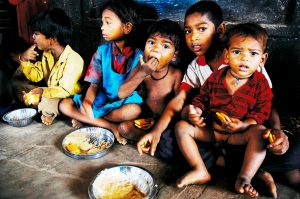 Three infants die every two minutes on an average in India due to lack of access to water, sanitation, proper nutrition or basic health services. According to a report by the United Nations Inter-agency Group for Child Mortality Estimation (UNIGME), about 8,02,000 infant deaths were reported in India in 2017. The number is reported to be the lowest in five years. However, the infant death numbers, as per the report, still remained the highest in the world, followed by China at 3,30,000.
Three infants die every two minutes on an average in India due to lack of access to water, sanitation, proper nutrition or basic health services. According to a report by the United Nations Inter-agency Group for Child Mortality Estimation (UNIGME), about 8,02,000 infant deaths were reported in India in 2017. The number is reported to be the lowest in five years. However, the infant death numbers, as per the report, still remained the highest in the world, followed by China at 3,30,000.
The under-five mortality of the girl child is 2.5 per cent higher (40 deaths per 1,000 live births) than the under-five mortality of the boy child (39 deaths per 1,000 live births). This gender gap has reduced significantly given that the difference was nearly 10 per cent in 2012. Globally, girl child survival rates are 11 per cent higher than boys.
This is in line with government data which show that in sick newborn care units across the country, there is a 60:40 ratio of boys and girls admitted. The Ministry of Health and Family Welfare has also flagged this issue to states but it has not borne results. This year’s Economic Survey estimated that 21 million Indian girls are unwanted — parents wanted a boy but had a girl instead.
Experts somehow believe that India is making good progress in combating infant deaths through a number of government initiatives. “It has to be taken into consideration that India has a birth rate of 25 million every year and the number of infant deaths has come down. It is lowest in five years. This is also the first time that the number of deaths under five is equal to number of births. The next step would be reducing the number of deaths,” said Dr Gagan Gupta, Chief of Health at the World Health Organization. “About 18 per cent of children born globally are from India.”
Following initiatives like Mission Indradhanush, Mother and Child Tracking System and neonatal ICUs in every district, India has made remarkable progress over the last five years. The number of Indian children who died before their fifth birthday went below one million for the first time. But at 9,89,000, the absolute number is still staggering.
The new report estimates that one child under 15 years dies every five seconds around the world but India’s share of global child deaths, for the first time, equals its share in the global birth cohort. India accounts for 18 per cent of global births, and now also 18 per cent of global child deaths following a decline from 22 per cent in 2012.
Last year, a report on the pneumonia and diarrhoea situation of the world — it was brought out by the International Vaccine Access Center, Johns Hopkins Bloomberg School of Public Health — had praised on Mission Indradhanush for bringing down the incidence of the two biggest killers of children below the age of five. In its first four phases, Mission Indradhanush vaccinated about 25 million children in over 500 districts, the report estimated.
India has the world’s largest birth cohort, and the four-point reduction in Infant Mortality Rate has led to 120,000 lives saved in one year. Another first for India is that its proportion of child deaths equals its share of the global births, with India accounting for 18 per cent of the total births and 18 per cent of U-5MR deaths worldwide. Just three years ago, more than one million children died before reaching their fifth birthday from preventable and treatable causes, such as preterm birth complications, acute respiratory infections such as pneumonia, intrapartum-related complications, congenital anomalies and diarrhoea.
Neonatal deaths, or newborn deaths within 28 days of birth, because of pregnancy-related complications, accounted for 53 per cent of all under-five deaths in 2016. Many of these newborns and children could have been saved by increasing institutional deliveries, postnatal follow-ups, improving mother and child nutrition, and providing water, sanitation and immunisations. Only one in five new mothers in India get the full antenatal care, shows National Family Health Survey 2016.
The UNIGME report said 6,05,000 neonatal deaths were reported in India in 2017, while the number of deaths among children aged 5-14 was 1,52,000. “India continues to show impressive decline in child deaths, with its share of global under-five deaths for the first time equalling its share of childbirths,” Yasmin Ali Haque, Representative, UNICEF India, said. “The efforts for improving institutional delivery, along with countrywide scale up of special newborn care units and strengthening of routine immunisation, have been instrumental towards this.”
The number of infant deaths has come down from 8.67 lakh in 2016 to 8.02 lakh in 2017. In 2016, India’s infant mortality rate was 44 per 1,000 live births. In 2017, sex-specific under-five mortality rate was 39 in 1,000 live births for male and 40 in 1,000 live births for females. “Even more heartening is the fourfold decline in the gender gap in survival of the girl child over the last five years,” Haque said. “The investment on ensuring holistic nutrition under the POSHAN campaign and national commitment to make India open defecation-free by 2019 are steps that will help in accelerating progress further.”
According to the report, an estimated 6.3 million children aged below 15 died in 2017, or 1 every 5 seconds, mostly of preventable causes, according to new mortality estimates released by UNICEF, WHO, the United Nations Population Division and the World Bank Group. A vast majority of these deaths — 5.4 million — occur in the first five years of life, with newborns accounting for around half of the deaths. “Without urgent action, 56 million children under five will die from now until 2030 — half of them newborns,” said Laurence Chandy, UNICEF Director of Data, Research and Policy. “We have made remarkable progress to save children since 1990, but millions are still dying because of who they are and where they are born. With simple solutions like medicines, clean water, electricity and vaccines, we can change that reality for every child.”
Globally, in 2017, half of all deaths under five years of age took place in sub-Saharan Africa, and another 30 per cent in Southern Asia. In sub-Saharan Africa, 1 in 13 children died before their fifth birthday. In high-income countries, that number was 1 in 185. “Millions of babies and children should not still be dying every year from lack of access to water, sanitation, proper nutrition or basic health services,” said Princess Nono Simelela, Assistant Director-General for Family, Women and Children’s Health at WHO. “We must prioritise providing universal access to quality health services for every child, particularly around the time of birth and through the early years, to give them the best possible chance to survive and thrive.”
The sharp decadal increase in institutional deliveries in public and private hospitals, up from 38.7 per cent in 2006 to 78.9 per cent in 2016, has lowered birth-related complications and helped India eliminate maternal and neonatal tetanus. But more needs to be done. It is imperative to widen the immunisation net so that all children are protected against vaccine-preventable diseases, such as diarrhoea and childhood pneumonia. Boosting breastfeeding is
another low-resource method to heighten childhood immunity and lower risk of infections. Only 41.6 per cent of children under the age of three were breastfed within one hour of birth in 2015, up from 23.4 per cent in 2005.
letters@tehelka.com











